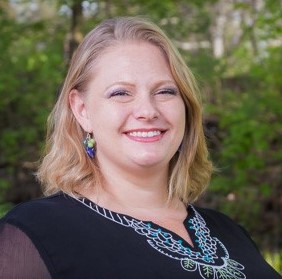
As part of our ongoing conversation on homelessness, we asked members of the Family Promise network and individuals working to serve families experiencing homelessness to share their personal thoughts and reflections on Family Promise and the issue of family homelessness. These writers are true thought leaders, using their skills and expertise to develop and implement creative solutions that are changing the lives of parents and children in their communities. This post is from Lindsay Moore, Family Promise National’s Midwest Regional Director.
My 12 and 7-year-old daughters won’t walk back into their classrooms for the rest of this school year. Thousands of children across the country face this new reality. The decision was difficult for those who made it and for those who had to hear it, but I am certain it was the right one.
Learning looks different now. Learning feels different now. While setting up our new digital learning space – that’s the fancy term I use for an area in the dining room now – I couldn’t help but reflect on classrooms. I took classrooms for granted, before this moment. Classrooms connect kiddos with so much more than education. Classrooms connect kiddos with each other for social support, they connect kiddos with teachers trained to instruct when students struggle and, for a kiddo without a stable place to call home, school can be the only place to connect with something “normal.” So, as I lined our family’s digital learning space with color-coordinated schedules and created dedicated space for each kiddo to organize their subjects and supplies, I realized our work, at Family Promise, is more important than ever. We’re the only shot at “normal” kids may have right now.
“I went to school and I was on autopilot, but, once I wouldn’t have had school, I would have had to face reality,” said Theresa Pinger, Guest Advisory Council member/program graduate, when asked to reflect on what a school shutdown would have meant for her when she and her family were in the rotational Family Promise program. Today, Theresa is pursuing her Human Resource Development degree, from the University of Minnesota, and continues volunteering with her Affiliate.
So, as classrooms close, Family Promise Affiliates are working to open opportunities for families facing this new normal, including making sure kiddos have the supplies and access to the technology needed. Unfortunately, not all school districts were ready for this crisis to trigger building closures, so students weren’t given the tools now needed, much less the parents the resources to take on this new role, in their children’s education. Without a supportive connection to a Family Promise Affiliate, students may not have a safe space to learn and their parents may not have the support needed to tackle this new role. Affiliates are working with families to create a new version of normal during what may have already been a stressful and chaotic time, so they are working with families, on an individual basis, to make sure each family is getting what’s needed.
Beyond the education aspect, Affiliates are helping families face concerns about childcare, wage loss, depression, and anxiety amid this uncertain crisis timeline. Thankfully, the Family Promise model allows for service across the spectrum of need – prevention, shelter, or stabilization. This crisis shines a spotlight on the reality we, at Family Promise, know all too well; too many families are on the brink of losing everything and “the system” set up to help them often works against families who fall just short of meeting the requirements but will fall further into crisis without assistance. Family Promise is set up to work with them.

